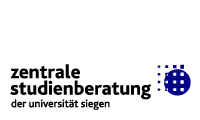Zentrale Studienberatung
im F-S Gebäude
Sandstraße 16-20
57072 Siegen
Erreichbarkeit der
studentischen Hotline:
0271 740-2712
Mo - Do: 9 - 16 Uhr
Fr: 9 - 12 Uhr
Mail:
info.studienberatung[at]
zsb.uni-siegen.de
Terminvereinbarung für eine Beratung über:
0271 740-2712
International Students
You find information about the admission procedure here:
STARTING
Impressum
Psychology

Short Information
| Restricted
admission |
Regular
study time |
Winter
semester |
Summer
semester |
|---|---|---|---|
| yes | 4 semester | ✔ |
Admission procedure
Restricted admission, application required, optional aptitude test, which does not take place before winter semester 2024/25 and will not be taken into account for applications for this semester
You can apply here
Degree
Master of Science
More information
Language of instruction
German
Deadlines
The degree program
The master's degree program in psychology aims to deepen and expand the basic psychological skills and knowledge acquired in the bachelor's degree program. Students acquire the ability to work independently using scientific methods and are prepared to work as a psychologist outside of clinical psychology. The focus of the master's program is set on psychology in the context of health, development and social change. By choosing the basic majors as well as the supplementary subject, students can also develop individual specializations. This allows students to gain insights into other master's degree courses as well as giving the option to focus on psychological research through a pre-doctoral program.
Curriculum content includes:
1. Advanced research methodological skills
- Advanced knowledge of statistical procedures (especially multivariate procedures), knowledge of methods of evaluation and computer-assisted data collection, modeling, and analysis
- Advanced knowledge of psychological diagnostics
- Implementation of own empirical-scientific projects
- Writing of a scientific text according to professional standards
2. Advanced fundamental psychological skills
3. Advanced competences in applied psychology
- Psychology in the context of health, development and social change
- Possibility of specialization in business psychology
- Pre-doctoral program in psychological research
Important information
An optional aptitude test is used as an additional criterion for the admission to the program. However, this test will not take place before the winter semester 2024/25 and will not be taken into account for applications for this semester. Detailed information on the application process and the selection criteria can be found "here".
Professional perspectives
The master's program opens up many career opportunities. Currently, master's graduates have very good opportunities on the job market. They can work in various, constantly growing professional fields:
- Teaching and research
- Industrial, organizational and business psychology (e.g. in personnel development)
- Educational psychology (e.g. as a school psychologist)
- Market research, advertising agencies, opinion research institutes, media psychologists
- Health psychologist, traffic psychologist, sports psychologist, expert for forensic psychology
Study organization
Examination regulations/program schedules/module
handbooks/internship regulations
Subject examination regulations (FPOs) define the basic
structures of a study program (e.g. admission requirements and
contents to be studied). For students, the current version of
an FPO automatically applies when they enroll in the first
subject-related semester. This means that even if the FPO is
changed during the course of studies, the original version
according to which one enrolled is still valid (provided that
this FPO does not expire). The respective study plan represents
the recommended exemplary course of studies in the individual
subjects and is part of an FPO. Supplementary regulations and
detailed information for each module to be studied can be found
in the module handbooks (e.g. requirements for taking a written
examination or information on the content of the
modules/courses, ...). The internship regulations define the
conditions under which the mandatory or optional internships
must be completed.
Before the start of the lecture period, we recommend that you
at least take a look at the study plan for your degree program
so that you know which modules are scheduled for the start of
your studies.


